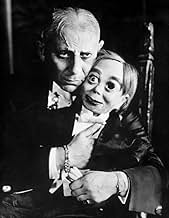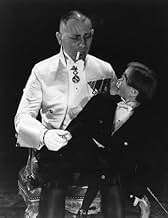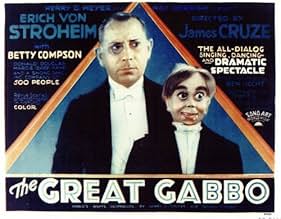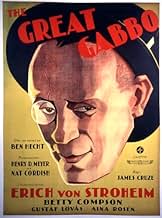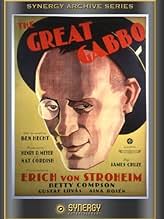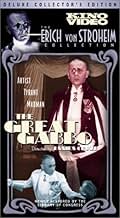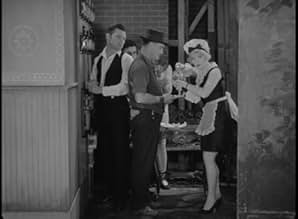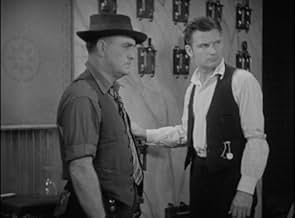IMDb RATING
6.0/10
1.1K
YOUR RATING
An insanely, egocentric ventriloquist, even though he is possessed by his wooden dummy, is in love with a dancer who is in love with another. The dummy gives advice to the ventriloquist.An insanely, egocentric ventriloquist, even though he is possessed by his wooden dummy, is in love with a dancer who is in love with another. The dummy gives advice to the ventriloquist.An insanely, egocentric ventriloquist, even though he is possessed by his wooden dummy, is in love with a dancer who is in love with another. The dummy gives advice to the ventriloquist.
Erich von Stroheim
- The Great Gabbo
- (as Eric Von Stroheim)
Marjorie Kane
- Babe
- (as Margie 'Babe' Kane)
George Grandee
- Otto
- (voice)
- (uncredited)
Bo Peep Karlin
- Dancer
- (uncredited)
Rosina Lawrence
- Dancer
- (uncredited)
Harry Ross
- Performer
- (uncredited)
Eddy Waller
- Vaudevillian
- (uncredited)
Marbeth Wright
- Dancer
- (uncredited)
- Director
- Writers
- All cast & crew
- Production, box office & more at IMDbPro
Featured reviews
Clunky solid gramophone sound and some sensational Ziegfeld stage numbers make this early talkie musical drama a real treat for viewers forgiving of 1929 movies. Vile schizophrenic ventriloquist brute, Von Stroheim, with his very creepy dummy (like the terrifying one in the DEAD OF NIGHT sequence with Michael Redgrave) seem somehow to be the toast of the stage. This 1929 showcase for both the technology of the day and the stage and screen stars rightly celebrated over the period are shown to be both fascinating and versatile as this film progresses. Other comments on this site will tell you the story and some criticize it's 1929 limits, but really THE GREAT GABBO is an excellent film of its day that rightly and clearly shows the force of Von Stroheim and the expert stage and screen dance entertainment popular in the 20s in the Ziegfeld sequences seemingly filmed right in front of a real stage. If you have seen THE BOYFRIEND the 1970 Ken Russell comedy you will get an idea of how fabulous THE GREAT GABBO must have looked in color. Most of the massive stage scenes are pale in my B/W copy and clearly are those sequences in Multicolour which the opening credits alert us to (be missing). Betty Boop sister Majorie Kane appears and most of the musical numbers are hilariously delightful, crowded with teens leaping about and bumping into each other in a great array of all sorts of fantasy costumes. The silliest and most enjoyable of which is a spider and fly number in which the above quote is hissed during a squabble in between verses. THE GREAT GABBO is a major find for students of 20s art deco, early talkie technology and very strong and effective acting. Von Stroheim must have been such a pain to Hollywood, a brute on screen and off. This film is full of wow! scenes. Highly recommended for anyone wanting further insight into the era. Other films worth seeing that add to the experience are GLORIFYING THE American GIRL, and THE 1929 SHOW OF SHOWS. The sound on my DVD copy is very good.
If there ever was any schizophrenic example of musicals then that would be 'The Great Gabbo'. This is disturbing psychological drama interrupted by lavish and wonderful dance and music numbers. James Cruze is credited as a director but to be honest most of the non-musical scenes have von Stroheim all written over them. And not only because von Stroheim played in them but there is some sort of very specific psychologically tense atmosphere in them. It is unknown to me how much control von Stroheim had over the production but it is clear (to everyone familiar with von Stroheim's work) that he at least gave some instructions.
The film is much more than just a curiosity - two seemingly different movies, a psychological drama, and a musical tied together. Erich von Stroheim brilliantly plays brilliant ventriloquist Gabbo who is mad or driven mad by his art. When we first meet Gabbo on the screen, we see an unpleasant cruel man who in his egocentrism and perfectionism blames everyone else for his failures. After his lover and partner Mary (Betty Compson) drops the tray in the middle of the performance, he accuses her again. She leaves her but not with a light heart. Pass the two years and they both have worked their way up into Broadway. They meet again when they both appear in the same review show.
The dramatic parts concentrating on Gabbo and his relationships with other people are good but quite poorly developed. Probably because of the forceful inclusion of the musical numbers that do nothing to forward the story or even add anything to it. And this is crystal clear while watching the movie. These would have worked in a lesser amount as just a backdrop for the story. Although, I have to say the musical numbers were interesting to watch but that was the wrong movie for them. The dramatic parts are heavy and the sudden transition into the musical numbers puts the viewer off. Although the musical numbers separately are interesting I found them distracting and thus it made it difficult to follow the story.
Although the movie is inconsistent and didn't quite work, it is still worth watching especially for its uniqueness in the musical category.
The film is much more than just a curiosity - two seemingly different movies, a psychological drama, and a musical tied together. Erich von Stroheim brilliantly plays brilliant ventriloquist Gabbo who is mad or driven mad by his art. When we first meet Gabbo on the screen, we see an unpleasant cruel man who in his egocentrism and perfectionism blames everyone else for his failures. After his lover and partner Mary (Betty Compson) drops the tray in the middle of the performance, he accuses her again. She leaves her but not with a light heart. Pass the two years and they both have worked their way up into Broadway. They meet again when they both appear in the same review show.
The dramatic parts concentrating on Gabbo and his relationships with other people are good but quite poorly developed. Probably because of the forceful inclusion of the musical numbers that do nothing to forward the story or even add anything to it. And this is crystal clear while watching the movie. These would have worked in a lesser amount as just a backdrop for the story. Although, I have to say the musical numbers were interesting to watch but that was the wrong movie for them. The dramatic parts are heavy and the sudden transition into the musical numbers puts the viewer off. Although the musical numbers separately are interesting I found them distracting and thus it made it difficult to follow the story.
Although the movie is inconsistent and didn't quite work, it is still worth watching especially for its uniqueness in the musical category.
Once again I am dumbfounded at how a great movie can get such a low rating on IMDb. All I can guess is that most of the voters were expecting to see a Gene Kelly-type musical. If this describes you, then leave now. "The Great Gabbo" is about as ANTI-musical as a musical can get. It is a heavy, ponderous, gripping story with more drama than Francis Ford Coppola could ever eke out of a reel of film. It is a compelling and surprisingly complex journey into the mind of a bizarre man.
This is the story of a misunderstood artist whose canvas is a puppet. But whereas the stereotypical story of the misunderstood artist depicts the protagonist as a static character, Gabbo is a highly dynamic individual who keeps us guessing throughout. Is he a good man? Is he a bad man? Is he sane? Is he mad? These questions are not answered until the spectacular & powerful finale, and even then there is much room for speculation.
(As an aside to you Kurosawa fans, the structure of this film is much like Kurosawa's 1952 classic "Ikiru", at times slow but building up to a powerful and unforgettable finish. And the final image deserves its place in the Louvre.)
Regardless of if you're prepared for this type of experience, one thing is for sure: the amazing performance of Erich von Stroheim will burn itself into your mind forever. This film, being one of the early talkies, does not mix much dialogue and music. That is, the spoken scenes are done in silence with no music underneath (much like the 1931 Fritz Lang masterpiece "M"). This means that the actors must carry the entire scene on their shoulders, like in the old days of Shakespearian soliloquies. Erich von Stroheim rises to the challenge in this minimalist setting, and HE DELIVERS. In some scenes he makes you hate him. In others you love him. He can elicit pity as well as admiration. What a roller-coaster ride! Pitted against the heavy drama, the musical numbers seem jarring and incongruous at first. But on further reflection we realize that this emphasizes the bipolar, schizophrenic nature of the subject. Just like Gabbo, a man divided between two worlds, this film divides itself between Broadway musical and psychological thriller. This movie was at least 80 years ahead of its time, if not more.
That's all I'll say because the rest is best experienced as a surprise. This is the best film I've seen in a long time, and the only reason why I'm rating it an 8 instead of a 10 is that, sadly, the original colour scenes were lost, and some of the scenes are in need of restoration on my DVD copy. We can only dream of what it was like to see "The Great Gabbo" as it was originally shown in 1929.
This is the story of a misunderstood artist whose canvas is a puppet. But whereas the stereotypical story of the misunderstood artist depicts the protagonist as a static character, Gabbo is a highly dynamic individual who keeps us guessing throughout. Is he a good man? Is he a bad man? Is he sane? Is he mad? These questions are not answered until the spectacular & powerful finale, and even then there is much room for speculation.
(As an aside to you Kurosawa fans, the structure of this film is much like Kurosawa's 1952 classic "Ikiru", at times slow but building up to a powerful and unforgettable finish. And the final image deserves its place in the Louvre.)
Regardless of if you're prepared for this type of experience, one thing is for sure: the amazing performance of Erich von Stroheim will burn itself into your mind forever. This film, being one of the early talkies, does not mix much dialogue and music. That is, the spoken scenes are done in silence with no music underneath (much like the 1931 Fritz Lang masterpiece "M"). This means that the actors must carry the entire scene on their shoulders, like in the old days of Shakespearian soliloquies. Erich von Stroheim rises to the challenge in this minimalist setting, and HE DELIVERS. In some scenes he makes you hate him. In others you love him. He can elicit pity as well as admiration. What a roller-coaster ride! Pitted against the heavy drama, the musical numbers seem jarring and incongruous at first. But on further reflection we realize that this emphasizes the bipolar, schizophrenic nature of the subject. Just like Gabbo, a man divided between two worlds, this film divides itself between Broadway musical and psychological thriller. This movie was at least 80 years ahead of its time, if not more.
That's all I'll say because the rest is best experienced as a surprise. This is the best film I've seen in a long time, and the only reason why I'm rating it an 8 instead of a 10 is that, sadly, the original colour scenes were lost, and some of the scenes are in need of restoration on my DVD copy. We can only dream of what it was like to see "The Great Gabbo" as it was originally shown in 1929.
This film about a ventriloquist who lives a self-imposed life of lonliness because of his personality is absorbing, different, and dated. Shortly produced after The Jazz Singer(1927), the film is an early talkie with all the characteristics of an early talkie. It has somewhat stilted stages, little camera movement, and most annoying, a bunch of Busby Berkley type musical numbers that have little to do with the plot. All that notwithstanding, the lead role of Gabbo, a man who lives to be successful no matter what it takes, who is willing to forsake personal happiness to achieve, who runs the scope of emotions in minutes, is played with gusto by that wonderful actor(and even greater director) Erich Von Stroheim. Von Stroheim uses all his European charm(and decadence) as the man who shares life and lives with and through his dummy Otto. There are no supernatural aspects about the relationship with Gabbo and Otto. The movie is in no way a horror picture(although very often advertised as such). It really is a story of the problems a man has exhibiting his emotions, living with others, and living with himself. Some of the scenes are very well-done, including the last shot as we see Gabbo avoid a ladder. The rest of the cast is effective with Betty Compson as a love interest doing a fine job, and Donald Douglas as a lead singer/romantic figure being absolutely absurd. If for no other reason, see the film to see Von Stroheim in action. There was no one like him.
Bizarre in the extreme but a highly entertaining film about a mad ventriloquist and the woman who loves him.
Erich von Stroheim makes his talkie debut as the spooky/mad ventriloquist who often speaks through his dummy (Otto) and eventually goes totally mad. Betty Compson plays his harried assistant who is finally driven away through his cruelty and madness. But they meet up again 2 years later when von Stroheim has become a star.
We get several scenes about the masochistic relationship between the stars played out against the background of a big New York revue. There are several terrific 20s songs in this film and one unforgettable production number with Compson and Donald Douglas as a fly and spider perched on a giant web.
The film also boasts the zippy Marjorie Kane who intros "That New Step." Von Stroheim is good and has a surprisingly light accent, but Compson steals the show as the pathetic assistant who can't understand him. She also gets to sing "I'm in Love with You" and adds one more talent to her resume of skills. Compson was also a concert violinist (see INSIDE THE LINES).
Compson and von Stroheim are excellent and the whole production becomes more and more surreal as it goes on. Certainly worth a look even if one number is missing (the "Ga Ga Bird") as are the Technicolor sequences. The whole film is black and white. The number "Every Now and Then" is tops.
Compson was one of the busiest actresses in Hollyword during the late 20s and early 30s.... she's a gem.
Erich von Stroheim makes his talkie debut as the spooky/mad ventriloquist who often speaks through his dummy (Otto) and eventually goes totally mad. Betty Compson plays his harried assistant who is finally driven away through his cruelty and madness. But they meet up again 2 years later when von Stroheim has become a star.
We get several scenes about the masochistic relationship between the stars played out against the background of a big New York revue. There are several terrific 20s songs in this film and one unforgettable production number with Compson and Donald Douglas as a fly and spider perched on a giant web.
The film also boasts the zippy Marjorie Kane who intros "That New Step." Von Stroheim is good and has a surprisingly light accent, but Compson steals the show as the pathetic assistant who can't understand him. She also gets to sing "I'm in Love with You" and adds one more talent to her resume of skills. Compson was also a concert violinist (see INSIDE THE LINES).
Compson and von Stroheim are excellent and the whole production becomes more and more surreal as it goes on. Certainly worth a look even if one number is missing (the "Ga Ga Bird") as are the Technicolor sequences. The whole film is black and white. The number "Every Now and Then" is tops.
Compson was one of the busiest actresses in Hollyword during the late 20s and early 30s.... she's a gem.
Did you know
- TriviaThe dummy Otto was a hand carved basswood Frank Marshall figure. The same man who designed Edgar Bergen's famous characters Charlie McCarthy and Mortimer Snerd.
- GoofsOverlooking the seeming impossibility of Gabbo having Otto the Dummy speak while Gabbo is eating, smoking, and drinking, Otto's head and mouth move with the words and music when Gabbo is at least six feet away.
- Alternate versionsGabbo le ventriloque (1929) was originally released by Sono Art-World Wide Pictures, with certain sequences were presented in Multicolor. However, current prints, restored by the Library of Congress and released by Kino International on DVD, exist only in black-and-white. Most, perhaps all, VHS and DVD releases of the film have the color sequences in black and white.
- ConnectionsEdited into The Girl from Calgary (1932)
- SoundtracksEvery Now and Then
(uncredited)
Written by King Zany and Donald McNamee
Performed by Marjorie Kane and Donald Douglas
Details
- Runtime
- 1h 32m(92 min)
- Color
Contribute to this page
Suggest an edit or add missing content

